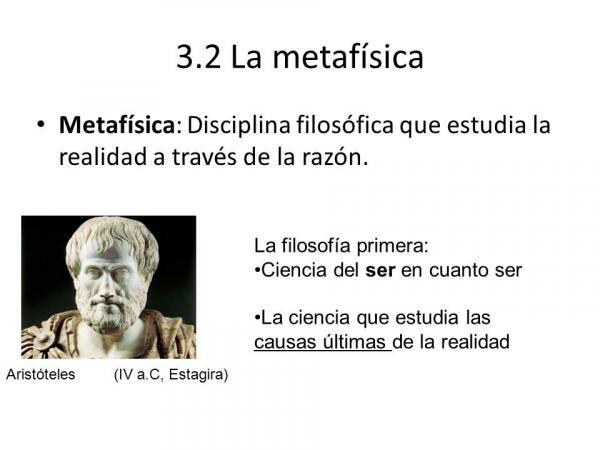Metaphysics in Philosophy: Simple Definition

Image: SlidePlayer
In this lesson from a TEACHER, we will talk about the definition of metaphysics in philosophy. The term was first used by Andronicus of Rhodes, in the 1st century BC, following Eudemo, to refer to what Aristotle would have called "first philosophy" (prima philosophya) or "theology." But the books of the stagirite were rearranged, so that the second philosophy preceded the first, and therefore, the name of first philosophy was replaced by that of meta tá physicá, Or what is the same, "What is beyond physics". Metaphysics constitutes a transcendent knowledge, insofar as it goes beyond experience, nature itself, to search for what underlies, what can only be known by reason.
Index
- The first or metaphysical philosophy
- What is Aristotelian metaphysics
- The goals of metaphysics
- Aristotle's reception in the Middle Ages: Saint Thomas Aquinas
The first or metaphysical philosophy.
Coincidence or not, the truth is that this second denomination is not far from the object of this discipline at all, that is born to find what is hidden behind physical objects, that is, things of "Nature". But for some authors, the classification is not a product of chance, since, although
metaphysics in philosophy, is the first in the order of principles, it is not so in the order of knowledge.For us, metaphysics constitutes a knowledge subsequent to the knowledge of natural things. This means that First things by nature is not the same as first for us and that particular things, those that can be perceived by the senses, even without being fundamental, are known beforehand. On the other hand, the first causes, the universal and necessary causes, those that are most remote perception, they are later in the order of knowledge, although the first in the order of real.

Image: Emilio Silvera Vázquez
What is Aristotelian metaphysics.
Every man wants, by nature, to know, he writes that of Estagira at the beginning of this work, and therefore, the metaphysics or science of first principles, is desirable in itself, and constitutes, for the philosopher, the quintessential wisdom.
Aristotle, defines the first metaphysics or philosophy, as the science of being as being, and it constitutes a type of knowledge different and higher than the knowledge of physical things, which deals only with a part of the being. The first philosophy he investigates the first principless, that is, the axioms that can be applied to all substances. He does not focus, then, like physics, on concrete things, but on those more abstract and fundamental.
Aristotle, also called theological philosophy to the science of being as being, since he studies the first substance, that which is the cause of the movement of everything else, being itself immobile, or what he would call the prime mover or God. According to the philosopher, there is an immobile and immutable being, which is the cause of the movement of all the rest. And this is what metaphysics deals with, what does not change, what remains immobile. Because movement and change are inherent to sensible things, of things in nature, and therefore, this type of knowledge would enter into the physics field.

Image: Slideshare
The objectives of metaphysics.
Thus, metaphysics would have a ontological object, but also theological, which has been the subject of many debates and discussions, on the importance of one aspect or another in Aristotelian philosophy. Because, as Gómez Lobo defends, at the same time that he affirms that something can only be talked about insofar as it exists and not because of its qualities, he also studiesdifferent types of cause, matter and form, the existence of mathematical objects or God.
It is not a systematic work, so researchers such as Pierre Aubenque, in The Problem of Being in Aristotle, argues that the Greek philosopher did not finish his research, mainly due to the difficulty of the issues to be addressed and the lack of heterogeneity of the work.
Aristotle's reception in the Middle Ages: Saint Thomas Aquinas.
Thomas Aquinas, he collects Aristotelian philosophy and defines metaphysics as the discourse of the entity, about the entity. For the philosopher, the first philosophy is the science of truth, and not of any truth, but of that truth that is the origin of all truth, that is, it belongs to the first principle by which all things are... the source of all truth. MetaphysicsIts object is the study of the first causes, the first cause being God, or what is the same, the truth.
For this philosopher, there is a dependency relationship between first or metaphysical philosophy and theology, between reason and faith, the former being subject to the latter. Because the theology, is a superior science and can never be contradicted by the truth of the philosophy, since if so, it would not be true, and therefore, it would have to be revised. The truth, for Santo Tomás, is only one. There is not one truth for philosophy and another for theology, independent of each other, as he argued. Averroes, but a single truth that can be known, both from reason and faith.

Image: Slideshare
If you want to read more articles similar to Metaphysics in Philosophy: Simple Definition, we recommend that you enter our category of Philosophy.
Bibliography
- Metaphysics. Aristotle. Ed. Gredos.
- The Problem of Being in Aristotle. Pierre Aubenque. Ed. Taurus Humanities. 1
- Philosophy in the Middle Ages. Etiene Gilson. Ed. Gredos.
- Philosophy Dictionary. Ferrater Mora. Editorial Alliance


